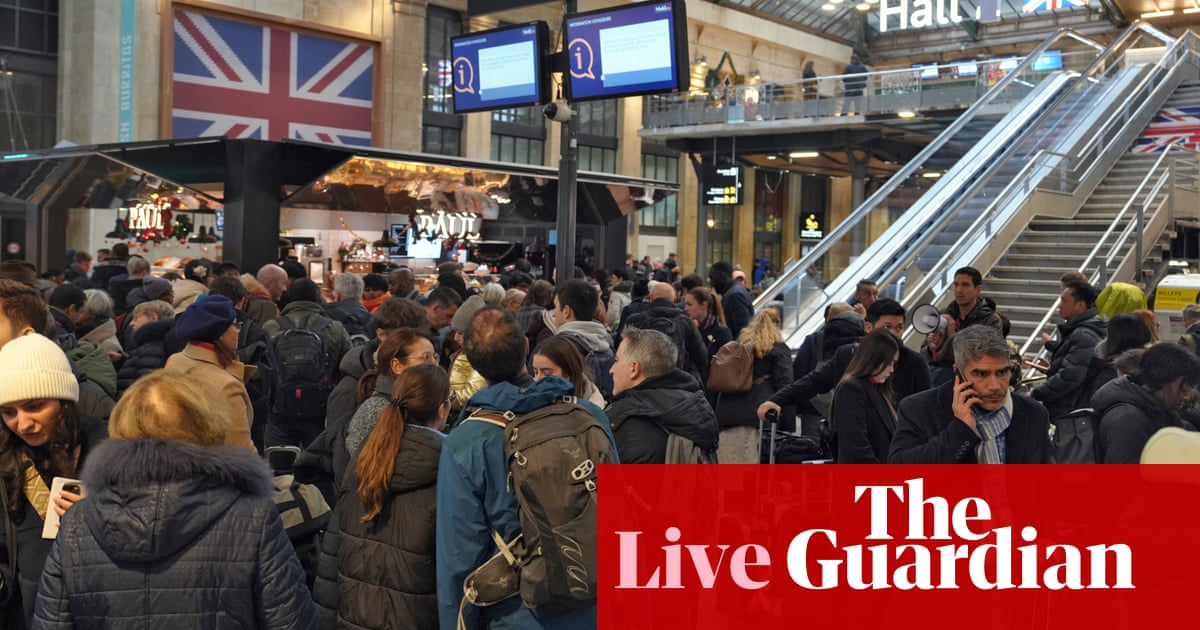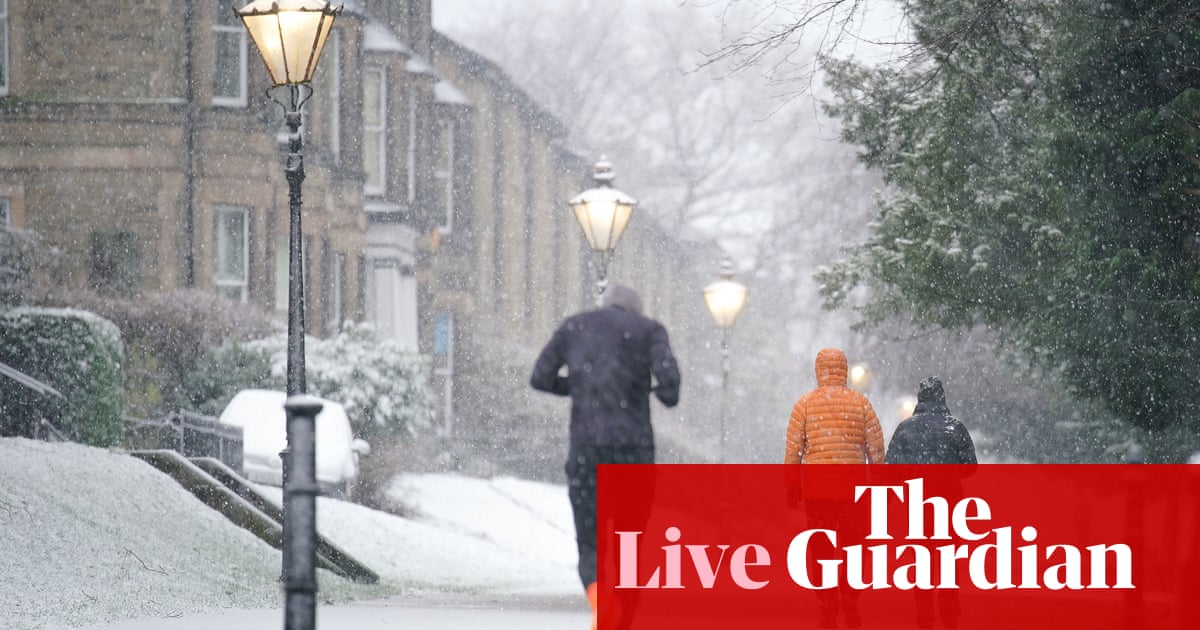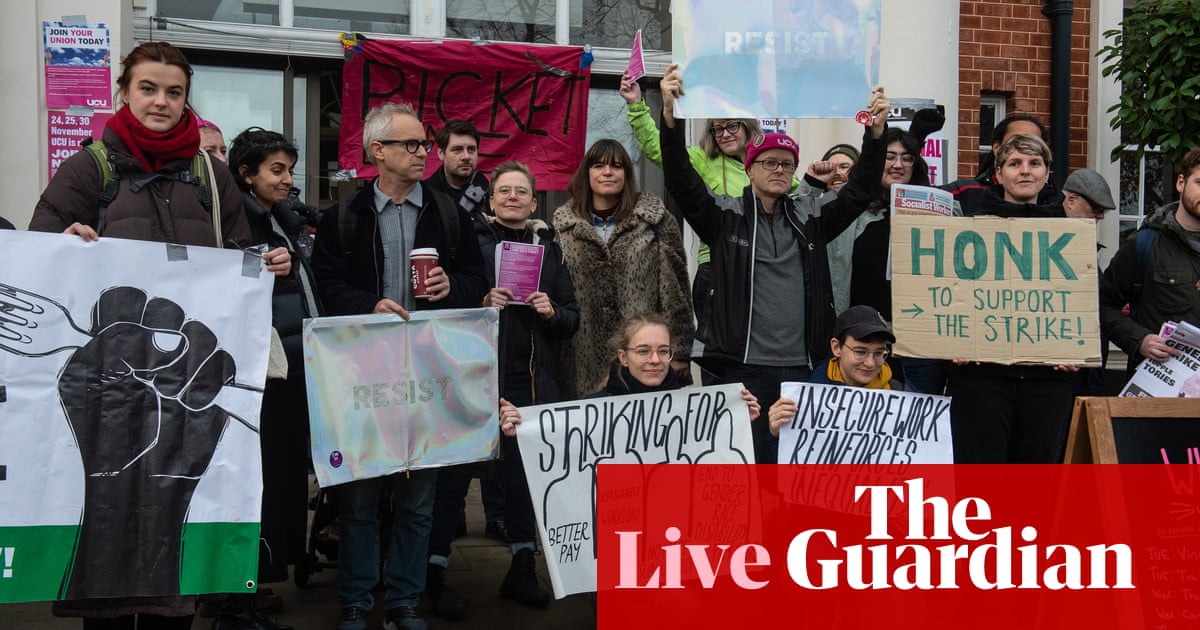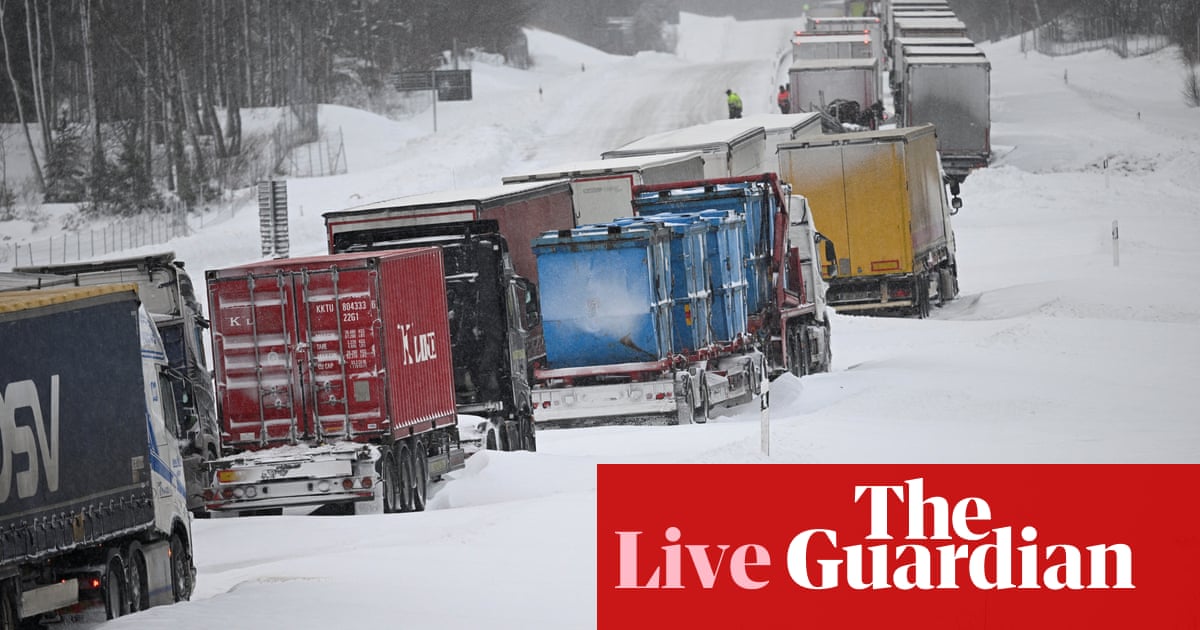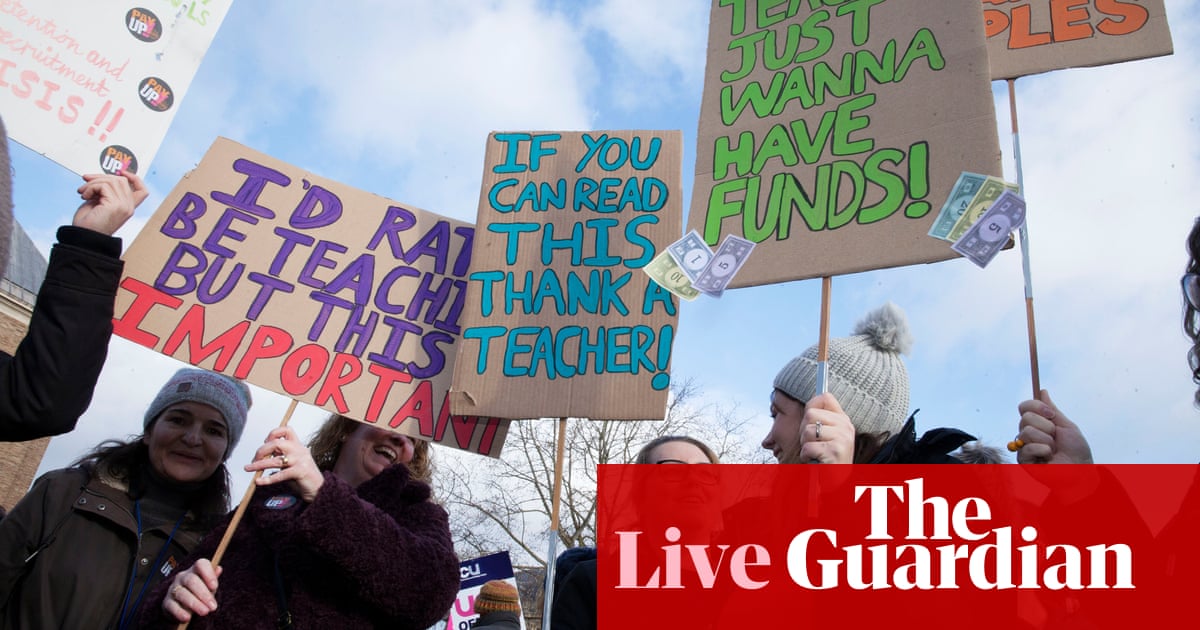
Closing Summary
Thanks for tuning into our live coverage of today’s strikes, the single biggest day of UK industrial action for more than a decade.
Up to half a million people participated in a coordinated strike today involving teachers, civil servants, border force staff and train drivers. Here’s a recap of the day:
One in eight schools and colleges in England and Wales were unaffected by today’s teachers’ strike, while 9% were closed entirely, according to a survey of head teachers carried out by the Association of School and College Leaders.
A majority of parents support strike action by teachers, despite the disruption it will cause them, according to a new poll by Parentkind, the membership organisation for parent-teacher associations. More than 1200 parents took part in the survey and over half (54%) said they supported strike action by National Education Union members, while only 36% opposed it.
At an NEU rally in Westminster, the RMT general secretary, Mick Lynch, told thousands of striking teachers outside Downing Street “we are the working class, and we are back”. He added: “We are here, we are demanding change, we refuse to be bought, and we are going to win for our people on our terms.”
When asked what prime minister Rishi Sunak is doing to sort out the industrial action, his official spokesman said: “We want to have further talks with the unions. Some of those discussions have been constructive. We have to balance that against the need to be fair to all taxpayers, the majority of whom don’t work for the public sector.”
Civil servants covering for striking Border Force staff received just two days’ training before taking up their posts, the Guardian understands. Some NCA staff in Calais say they had little official training before being put to work at passport control
Union leaders have given the education secretary until the end of the month to ‘change her stance’. Mary Bousted and Kevin Courtney, the joint general secretaries of the NEU, said: “Today, we put the education secretary on notice. She has until our next strike day for England, 28 February, to change her stance.”
Thousands of students have joined striking university staff on picket lines across the country, the University and College Union (UCU) said. Jo Grady, UCU general secretary, said: “We have been overwhelmed by the support of thousands of students who have joined us on picket lines across the country.”
The former shadow chancellor has said public sector pay rises can be paid for by taxing capital gains at the same level as income. John McDonnell said: “We just need a fair taxation system. The issue at the moment is that we seem to have a Government that is redistributing wealth upwards.”
The TUC has not ruled out taking the government to court if the minimum service levels bill is passed into law. Trades Union Congress assistant general secretary Kate Bell said the legislation is “unnecessary, unfair and almost certainly illegal”.
The Welsh government education minister said the blame for the strikes lies with the UK government. As the government tries to resolve the dispute, Jeremy Miles said: “there are very real constraints on the Welsh government’s budget because of the frankly disgraceful position the UK government aren’t making enough funding available across the UK for public services.”
A deal that would bring an end to strikes is “further away than when we started” following months of failed negotiations with the government, said the Aslef general secretary, Mick Whelan. “This isn’t a new government – the same people have been in place for 12 years,” he told PA Media.
Kevin Courtney, joint general secretary of the National Education Union, said: “I think Gillian Keegan [the education secretary] is hoping our strike is ineffective and people won’t do it again.” He added: “I think she’s wrong about that. There could be further action. She needs to do a deal so that that doesn’t happen.”
The National Education Union stands ready to negotiate once the education secretary “gets her act together and her story straight”, said union chief Mary Bousted. “Unfortunately about 85% of schools will be impacted for a strike that didn’t need to happen if the government had been prepared to negotiate,” she said.
Heathrow airport said it was operating as normal with minimal queuing in immigration halls despite the strike by border force workers. “Heathrow is fully operational, passengers are flowing through the border smoothly with Border Force and the military contingency providing a good level of service for arriving passengers,” a spokesperson for the airport said.
Paying public sector workers is a matter of “political priority”, said the general secretary of the Public and Commercial Services union (PCS), Mark Serwotka. He said the government claimed it would cost £29bn to give every public sector worker what they’ve demanded; however, its calculations are near £10bn. “And £10bn in an economy like ours can easily be found,” said Serwotka.
Education secretary Gillian Keegan told Sky News “our objective this year is to get rid of the problem, which is inflation.” Keegan told Times Radio she was “disappointed” that a strike by teachers in England and Wales are going ahead and said the industrial action was unnecessary as discussions with the unions were continuing.
Strikers unite across England: ‘Our disputes may be separate but we have one aim’
In what was billed as the biggest day of industrial action in a decade, workers from teachers to train drivers, civil servants to university staff went on strike on Wednesday.
Guardian reporters spoke to groups of workers on picket lines and at demonstrations in Bristol, Birmingham and London.
At a rally in Glasgow nearing lunchtime, the deputy general secretary of the Scottish TUC Dave Moxham said the British people were “seeing through” the UK government’s reasons for the bill.
Speaking to BBC Radio Scotland, he said the mood was “resolute, confident but also angry because it’s a really bad choice to say to people during a period when - through desperation in many cases - they’re taking in action that someone’s going to take that right away.”
This bill goes way beyond other countries quoted by the government, it fundamentally removes the right of strike from some workers and it gives employers or even the business secretary the choice of who they decide should lose that fundamental right to strike. It’s not necessary in terms of safety, it’s highly unnecessary in terms of people’s liberty and it’s something we’ll continue to oppose.
Moxham said there was a “completely different atmosphere” in terms of how the Scottish government approached industrial action, amidst ongoing public sector pay disputes across the country that have most recently seen teachers on strike across 16 days of rolling strikes.
“We’re much closer to them in terms of our shared understanding of trade union democracy.”
Staff working at the Scottish parliament in Edinburgh and the Scottish government have also walked out today and the Scottish Greens and Scottish Labour will not be participating in any parliamentary business on Wednesday.
Just one in eight schools and colleges in England and Wales have been unaffected by today’s teachers’ strike, while 9% were closed entirely, according to a survey of head teachers carried out by the Association of School and College Leaders.
The survey was carried out this morning by the union and found that 13% of schools that responded were fully open as normal or had no teachers on strike.
Geoff Barton, the ASCL’s general secretary, said:
The overwhelming feeling among school and college leaders and teachers today will be one of sadness that we have reached a point at which strike action has been taken as a last resort against a government that will not listen.
“This has clearly been a difficult day for everyone concerned, but the stark truth is that the erosion of teacher pay and conditions over the past decade, and resulting teacher shortages, mean every day in education is a difficult one.
“We implore the government to avert further industrial action by improving pay and conditions and addressing the teacher recruitment and retention crisis.”
Of 948 head teachers and principals in England and Wales, mostly in secondary schools, 97% (920) reported that teachers were on strike. In 35% (330) more than half of teachers took part in the industrial action.
Of the 920 schools and sixth-form colleges where teachers were on strike:
11% (97) were fully open with all students on-site
80% (738) were partially open with some students on-site
9% (85) were completely shut with no students on site.
Those that were partially open or completely shut took a range of measures to support students, depending on how the circumstances of the strike affected their setting.
Of these 823 respondents:
86% (709) provided work for students to do at home
81% (668) had on-site provisions for vulnerable students
35% (284) made phone calls to vulnerable students who were not on-site
38% (315) had on-site provisions for children of critical workers
60% (496) had on-site provisions for exam year groups
17% (136) had on-site provisions for students eligible for free school meals, with others providing measures such as packed lunches and vouchers
More than 100,000 teachers took to the streets, demanding a pay rise above inflation, funded by the government, rather than from existing school budgets.
The value of teachers’ salaries has fallen significantly in recent years, contributing to a recruitment crisis in schools. Further strikes are expected from the public sector as pressure mounts on the government to increase salaries.
A majority of parents support strike action by teachers, despite the disruption it will cause them, according to a new poll by Parentkind, the membership organisation for parent-teacher associations.
More than 1200 parents took part in the survey and over half (54%) said they supported strike action by National Education Union members, while only 36% opposed it, and almost two thirds (63%) agreed teachers should receive a pay settlement in line with current inflation.
Parentkind’s CEO, Jason Elsom, said:
With strike action taking place today across England and Wales, parents will be managing with a varied picture of partial or total school closures. What our polling has shown however, is that despite the inconvenience caused by industrial action, the majority of parents clearly support the action being taken by teachers.
“Nobody wants schools to be closed and nobody wants children to lose days of learning, and so it’s in this vein that parents across the country want the government and the teaching unions to work together to achieve a fair and lasting settlement to the question of teacher pay. Only then can disruption to children’s education be kept to a minimum.”
Speaking at an NEU rally in Westminster, the RMT general secretary, Mick Lynch, told thousands of striking teachers outside Downing Street “we are the working class, and we are back”.
Lynch said, according to PA news:
Welcome to Westminster, the house of fools and the house of the corrupt … Last year, Grant Shapps, remember him? He’s still around. Lurking around all of these buildings here, running the Government, telling Rishi Sunak what to do, trying to ban the working class.
“He was telling the media that the railway workers have got no friends, that we would be back at work, and how dare we ask for a pay rise when teachers can’t afford to live when nurses are more deserving cases, when public-sector workers can’t get a pay deal.
“Our message then, as it is today, is every worker needs a pay rise, every worker needs a square deal.
And our message is sod this, we demand, and we are united. We will not be divided on the basis of who we work for. We will not be divided on the basis of our belief, or the colour of our skin, or the part of the country we are from. We are the working-class, and we are back. We are here, we are demanding change, we refuse to be bought, and we are going to win for our people on our terms.”
When asked what Rishi Sunak is doing to sort out the industrial action, his official spokesperson told PA news:
We want to have further talks with the unions. Some of those discussions have been constructive. We have to balance that against the need to be fair to all taxpayers, the majority of whom don’t work for the public sector.
“As we’ve seen from the IMF just this week, inflation is one of the biggest risks to people’s pay packets and the government will continue to take responsible action to ensure public sector workers are paid fairly but that it’s also affordable for the taxpayer.”
When asked about the apparent unwillingness of the prime minister or chancellor to meet with union leaders, the official said:
I wouldn’t agree with that statement. I think it is true that obviously we need to consider it in the round.
“But equally, we think the fair thing to do is to have an independent body that considers things like inflation, and other input factors like retention and recruitment in coming to a judgment. That’s what’s happened this time round, that’s what we think should happen for the current pay review period we’re in.”
Border Force strike: cover staff report getting just two days’ training
Exclusive: Some NCA staff in Calais say they had little official training before being put to work at passport control
Civil servants covering for striking Border Force staff received just two days’ training before taking up their posts, the Guardian understands.
During the first set of strikes in December, members of the armed services and staff from Whitehall received between five and seven days of training before being asked to check on crimes such as carrying a false passport, drug smuggling, people trafficking and modern slavery.
Border Force guards are usually given three weeks of training as a minimum before they interact with the public. After the three weeks, they are given a mentor to work alongside for up to a month to ensure they can work solo on a passport desk.
But some National Crime Agency (NCA) staff who are working in Calais received just two days of official training before being put to work at passport control.
One informed source said: “Staff from NCA have been brought in to cover strikers in Calais. Two days of training and a quick familiarisation visit on Tuesday and then protecting the borders on Wednesday.”
Union leaders give education secretary until end of month to "change her stance"
The education secretary must “step up with concrete and meaningful proposals” on teachers’ pay to prevent further strikes, union leaders have said.
Mary Bousted and Kevin Courtney, the joint general secretaries of the NEU, said, PA news reports: “This is no cause for celebration, but an indication of the level of anger among our members.
It is a huge statement from a determined membership who smashed through the Government’s thresholds that were only ever designed to prevent strike action happening at all. Today, we put the education secretary on notice. She has until our next strike day for England, 28 February, to change her stance.
The National Education Union (NEU) has estimated around 85% of schools in England and Wales have been affected by teacher strikes.







